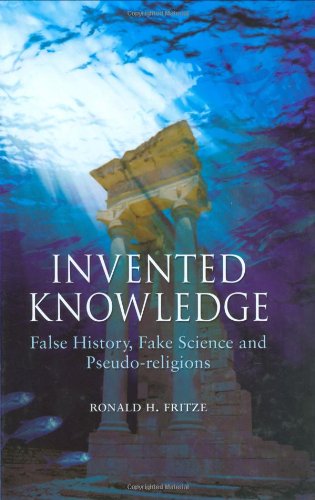Product desciption
Invented Knowledge False History Fake Science And Pseudoreligions Ronald H Fritze by Ronald H. Fritze 9781861894304, 1861894309 instant download after payment.
Who is to say what is real history and what is false, faked, or otherwise bogus? The historian Carl Becker once famously wrote of "everyman [as] his own historian," suggesting that we all individually choose what to assign value to in the episodic past and we construct a usable history to satisfy ourselves. Mostly that is fine, but sometimes it takes strange turns. This book, by one of my graduate student colleagues of many years ago, explores how bizarre some of this construction of the past may become. It is an outstanding analysis of the strange and weird in history. "Invented Knowledge" is mostly about conspiracy theories and concepts of supposedly "repressed" truths in human history. Fritze begins with a lengthy discussion of the possibility of a lost continent of Atlantis. It is certainly one of the most persistent of beliefs held by people of all times and places despite the lack of hard evidence supporting its existence. Fritze appropriately calls it the "mother of pseudohistory." Chapters follow on myths surrounding the discovery and settlement of ancient America. My personal favorite is the so-called Welsh Indians, a group supposedly led to America by Prince Madoc in the twelfth century which formed its own tribe. Many expeditions sought to find this group, and Lewis and Clark and others believed that Mandan tribe in the upper Midwest were the descendents of these pioneers. Of course, different populations reached America in different ways and there is much speculation and only modest hard evidence. Accordingly, it is easy for pseudohistory to emerge when evidence is minimal and conflicting. Ron Fritze also expends considerable effort, two full chapters, discussing the construction of racist cosmogonies. His explanation of the rise of racist perspectives among both white and black separatists is illuminating and frightening. Those chapters make up the heart of the book and offer a fascinating analysis of radical subcultures in modern American society. Additional sections of the book explore the catastrophism of Immanuel Velikovsky, the ancient astronauts theories of Erich von Dänikan, the vanished of ancient ice age civilizations, and the "Black Athena" debate launched by Martin Bernal in 1987. That last chapter has the scintillating main title, "Professors Gone Wild." The takeaway from "Invented Knowledge" is that while there is credible historical analysis on all of these subjects and respectable theories have been offered, that there is still are those who prefer pseudohistory predicated on poor sources, outrageous assumptions, unrealistic theories, and in some cases insane connections. There is not lack for promoters of these wild explanations, some of whom are clearly unhinged and some of whom are charlatans. In every case Fritze debunks the outrageous and offers legitimate explanations. But does evidence and argumentation really make a difference to what one believes about the past? For many people it does. For believers in conspiracy and many of the weird ideas discussed here it probably doesn't. This leads to the question, who has the authority to decide what the history says? An old baseball joke is apropos here. Three umpires were discussing how they call balls and strikes behind the plate. The first said, "I call them as they are," a pre-modern, absolutist position. The second said, "I call them as I see them," a position reflecting rationality and modernity. The third opined in a fit of post-modern existential angst, "They ain't nothin' til I call them." It seems that this last perspective is the critical element in considering the stories told in "Invented Knowledge." Perhaps the reality of what happened does not matter all that much; the only thing that is truly important is the decision about its meaning. That may well be an intensely personal decision predicated on many idiosyncrasies and perspectives. I find that a fascinating issue to ponder. My thanks to Ron Fritze for raising these issues and exploring their meaning in modern America.


